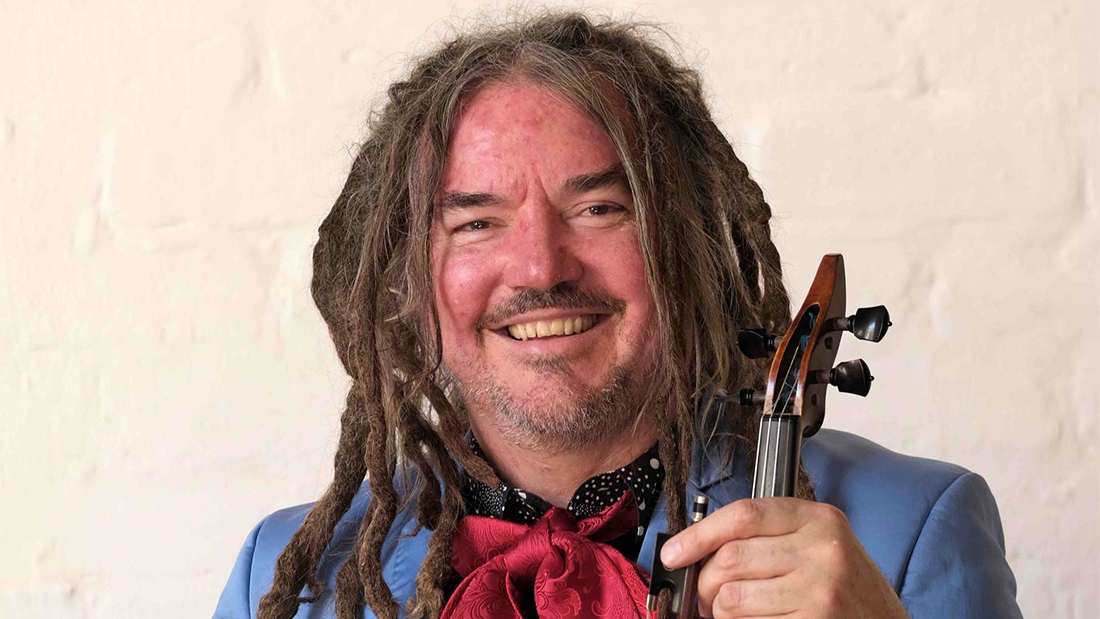
The magical logic of Rupert Guenther
Perth-based Vienna-trained composer-violinist Rupert Guenther is set to embark on the world premiere tour of his newest sonata of evocative improvisations, New Letters To Esterhazy, at Government House in Perth on Friday, June 30 (get more info and tickets here). Commissioned and recorded by ABC Classic FM, the sonata is an intimate story that depicts imaginary letters from the artist in 21st century Australia sent back in time to Austrian musician Joseph Haydn in the 18th century Austro-Hungarian court of Esterhazy. BRAYDEN EDWARDS spoke to Rupert Guenther to find out about the changing world of classical music, the magic of improvisation, and what audiences can look forward to at his upcoming performances.
It’s great to have you in Perth this month to premiere your new piece New Letters to Esterhazy. How long has the idea for this composition been in the works for, and how will it feel to bring it to live audiences?
These works were recorded in Melbourne by the ABC Classic FM in 2007, but this is the first time I’ve had management in place to release the new work and do a tour. It’s a a bit strange waiting so long, but that’s the arts for you. I’m very pleased that the works will now finally see the light of day, that I’ll be sharing them with audiences in concert halls all over Australia, and getting radio airplay now as well. There’ll be a few shorter new works from early this year on the program too, which is also a really exciting element.
The sonata is said to depict ‘imaginary letters sent back in time to Austrian musician Joseph Haydn in the 18th century.’ What was it about Haydn that made you want to make him the focus of this piece?
In reality I was invited to record in the ABC studios, and the music just came out as it is on the album. It took me months afterwards to really understand what it was about. It slowly began to dawn on me how Haydn had set some huge things in motion back then, and through my background of studying and living in Vienna, that I wouldn’t be who I am today without what he did. So it’s like waving to him through time, saying “hey, the torch you lit is still burning brightly, even all the way over here in Australia.”
When you are conceptualising a work like this, do you learn about the subject matter? What helps you imagine what a new piece should sound like?
It works both ways. Sometimes I make a significant study of the history, events and artefacts as I did with the concert series coming up at the WA Museum, and even go to the places where it all took place. That feeds into the music. But as often, contemplating life in a meditative and intuitive way can tap you into awesome journeys and revelations which seeps into in the music, and then it just comes tumbling out with its own magical logic.
How does your approach to performing music differ from ‘traditional’ classical players? Or to put it another way, what’s something you don’t like about classical that you have tried to do differently?
All my concerts are inspired improvisations, so I’m shaping the story of the city I’m in, or a forest, or some historic place for example. It’s like being a painter – in my concerts I paint exhibitions of my own musical “pictures.” So I am an original concert artist, I play all my own music, which is very different from what most classical musicians do in playing music from the page written down by the traditional composers, or even by modern composers.
Classical isn’t the first genre of music that comes to mind when we think of improvisation, but it was central to the craft in its earliest days, especially when it was rare to write down and record music. How do you learn improvisation, when by its own nature it is not intended to be replicated, and naturally doesn’t come with tabs or sheet music?
(smiling) We don’t learn improvisation, we begin it. Sure, you can watch others and learn insights from how they do it, but as you said, by its nature it is spontaneously created. I approach it like painting – I just start and then add to it and then there comes a point where you go “okay I think that’s complete now.” The other thing is that improvisation is supposed to be making your own mark, so it’s best to let flow just how comes naturally to you, and let it unfold without overthinking it. I choose to use a classical tone and way of making the music speak, so it sounds like a classical violin, yet it is still somehow new music of now.
And what artists inspire you today? Do you take inspiration from other genres of music, or even outside music?
I get inspired by seeing musicians create their own music, so it tends not to be classical artists for that reason – often blues, or world music. Having said that, I like the ancient music of the 12th century minstrels, also the Persian and middle eastern sounds from 12-14th centuries, also the 20th century music of Ligeti, Paert, Xenakis, Bartok, Schoenberg, Penderecki and Shostakovich as just some examples.
But I am as much influenced by painters such as Rothko and Pollock, and many great philosophers too – it’s the beautiful humanitarian streak in all these artists which draws me to them. I’m moved to make music inspired by historic or contemporary world events, my own journeys in life, places I visit. Almost all of my work is site-specific in this way.
People often think of classical music as a centuries-old craft, but what new and exciting things are happening that are changing classical music in the 21st century?
I think the basis of classical music has always been to move people, to touch their hearts and souls, to restore them to aspire to greater things than what we often get caught up in in life. So in terms of change, there are now certainly more performers making abstract soundscapes, concerts of white noise, multi-media works, integrating computer generated elements etc…it’s often very interesting art music.
However, for me to be captivated it still needs to move me deeply. I’m hoping that musicians keep that healing touch, and that more people follow my example and set out as on careers as original classical artists performing their own works, especially through improvisation. That would will be pretty exciting. In the pop music world that doesn’t sound significant because we are used to hearing original artists all the time, but in the classical music world it is absolutely revolutionary.
What’s next for you after these shows? Any big plans for the rest of 2023 and beyond?
I still have the two big concerts at the WA Museum coming up, with Music From Inside The Pyramids which coincides with the big Egyptian exhibition and its focus on the Afterlife, and the Journeys concert later in the year which is based on the whole history of human migrations over thousands of years and examines all the factors which have caused these upheavals in populations. The museum concerts are all with live music which takes you on a deep journey, with additional live narration, and a huge 6 metre screen with projection of powerful images which relate specifically to each show. Then it’s more tours, both here and in Europe for the next two years.
